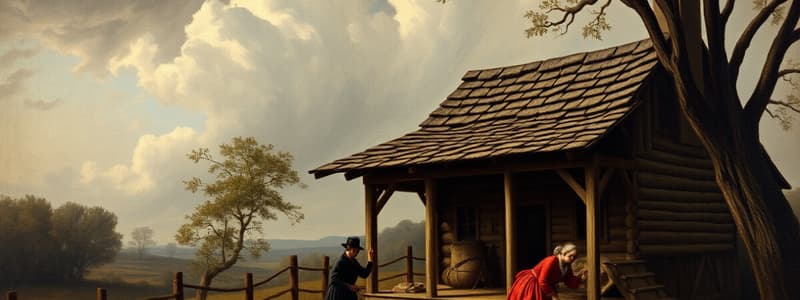Podcast
Questions and Answers
Who is the author of Uncle Tom's Cabin?
Who is the author of Uncle Tom's Cabin?
Harriet Beecher Stowe
What is Uncle Tom's Cabin about?
What is Uncle Tom's Cabin about?
A book about a slave who is treated badly, published in 1852, that persuaded many to become anti-slavery.
Who wrote The Impending Crisis of the South?
Who wrote The Impending Crisis of the South?
Hinton Helper
What did Hinton Helper argue in his book?
What did Hinton Helper argue in his book?
What is Kansas known for in the context of popular sovereignty?
What is Kansas known for in the context of popular sovereignty?
What was the New England Emigrant Aid Company?
What was the New England Emigrant Aid Company?
What was significant about the census of 1860 in Kansas?
What was significant about the census of 1860 in Kansas?
What happened at Shawnee Mission in 1855?
What happened at Shawnee Mission in 1855?
What is Lawrence, Kansas known for?
What is Lawrence, Kansas known for?
Who was John Brown?
Who was John Brown?
What did John Brown do at Pottawatomie Creek?
What did John Brown do at Pottawatomie Creek?
What was the Lecompton Constitution?
What was the Lecompton Constitution?
Who was James Buchanan?
Who was James Buchanan?
What did Senator Douglas support?
What did Senator Douglas support?
What was Charles Sumner known for?
What was Charles Sumner known for?
What happened during the Election of 1856?
What happened during the Election of 1856?
Who was the first presidential candidate of the Republican Party?
Who was the first presidential candidate of the Republican Party?
What was the Dred Scott case about?
What was the Dred Scott case about?
What did Chief Justice Taney assert in his Dred Scott decision?
What did Chief Justice Taney assert in his Dred Scott decision?
What caused the Panic of 1857?
What caused the Panic of 1857?
What was the Homestead Act of 1860?
What was the Homestead Act of 1860?
What did the Tariff of 1857 achieve?
What did the Tariff of 1857 achieve?
What were the economic issues of the 1860 election?
What were the economic issues of the 1860 election?
Who ran against Senator Douglas in the Illinois senatorial election of 1858?
Who ran against Senator Douglas in the Illinois senatorial election of 1858?
What is the Freeport Doctrine?
What is the Freeport Doctrine?
What happened at Harper's Ferry?
What happened at Harper's Ferry?
Who was Robert E. Lee?
Who was Robert E. Lee?
What was significant about the Election of 1860?
What was significant about the Election of 1860?
Who was John C. Breckinridge?
Who was John C. Breckinridge?
What was the Constitutional Union Party?
What was the Constitutional Union Party?
Who was John Bell?
Who was John Bell?
What were the Confederate States of America?
What were the Confederate States of America?
Who was Jefferson Davis?
Who was Jefferson Davis?
What did James Henry Crittenden propose?
What did James Henry Crittenden propose?
What were the Crittenden Amendments?
What were the Crittenden Amendments?
Flashcards are hidden until you start studying
Study Notes
Harriet Beecher Stowe
- Authored "Uncle Tom's Cabin," published in 1852, which became a crucial anti-slavery novel.
Uncle Tom's Cabin
- Depicts the harsh realities of slavery, influencing Northern attitudes toward abolition.
The Impending Crisis of the South
- Written by Hinton Helper to demonstrate the negative impact of slavery on non-slave-owning whites.
- Helper faced hostility in the South and had to publish in the North.
Hinton R. Helper
- Known for writing "The Impending Crisis," arguing that non-slaveholding whites suffered most from slavery.
- Captured and killed by Southerners due to his anti-slavery stance.
Kansas
- The site of significant conflict over slavery, illustrating failures of popular sovereignty.
New England Emigrant Aid Company
- An anti-slavery group that sent settlers to Kansas to promote abolitionist efforts.
Census of 1860
- Documented 2 slaves in Kansas among a population of 107,000 and 15 in Nebraska.
Shawnee Mission
- Location where pro-slavery individuals from Missouri manipulated elections in favor of slaveholding interests.
Lawrence, Kansas
- Significant battleground in "Bleeding Kansas," marking the beginning of violent confrontations between pro-slavery and anti-slavery factions.
John Brown
- Radical abolitionist who attempted a slave uprising at Harper's Ferry and was executed for his actions.
Pottawatomie Creek
- Site where John Brown and his followers murdered five pro-slavery settlers in retaliation for violence against abolitionists.
Lecompton Constitution
- Proposed constitution supporting slavery that was ultimately rejected, contributing to Kansas becoming a free state.
James Buchanan
- 15th U.S. President (1857-1861) whose attempts at compromise frustrated both pro-slavery and anti-slavery factions.
Senator Douglas
- Architect of the Kansas-Nebraska Act, promoted popular sovereignty, and ran against Lincoln in the senate election.
Charles Sumner
- Delivered a speech, "The Crime Against Kansas," criticizing pro-slavery actions and subsequently assaulted by Preston Brooks.
Preston S. Brooks
- South Carolina representative who violently attacked Sumner, representing Southern honor in the conflict over slavery.
Election of 1856
- Featured Buchanan (Democrat), Fremont (Republican), and Fillmore (Know-Nothing); Buchanan's victory was influenced by his stance on popular sovereignty.
John C. Fremont
- First Republican presidential candidate opposed to the expansion of slavery; gained significant support in the 1856 election.
American Party
- Formed by the Know-Nothings, focusing on anti-immigrant sentiments following the immigration wave post-1846.
Dred Scott
- Slave who sued for his freedom based on residency in a free territory, leading to a landmark Supreme Court case.
5th Amendment
- Protects individuals from self-incrimination and guarantees due process, relevant in legal discussions surrounding slavery cases.
Chief Justice Taney
- Wrote the Dred Scott decision, reinforcing the rights of slaveholders and controversial interpretations of property rights.
Panic of 1857
- Economic downturn affecting mainly the North, driven by various factors including over-speculation and international issues.
Homestead Act of 1860
- Intended to provide land at a low cost; vetoed by Buchanan, illustrating tensions around land rights and settlement.
Tariff of 1857
- Major tax reduction that lowered tariff rates to about 17%, impacting U.S. trade and economy.
Economic Issues of 1860 Election
- Focus on protection for vulnerable industries and land access for the impoverished.
Illinois Senatorial Election of 1858
- Featured a pivotal contest between Stephen Douglas and Abraham Lincoln, shaping future political dynamics.
Freeport Doctrine
- Stated by Douglas during Lincoln-Douglas debates, asserting that territories could determine their own slave status.
Harper's Ferry
- Site of John Brown's failed raid intended to incite an armed slave revolt, culminating in his capture and execution.
Robert E. Lee
- Confederate general opposing secession yet believing the Union should not be maintained by force.
Election of 1860
- Resulted in Lincoln's victory due to Democratic Party splits over slavery, leading to Southern discontent and secession.
John C. Breckinridge
- Pro-slavery Democratic candidate in 1860, contributing to the division within the Democratic Party.
Constitutional Union Party
- Formed by former Whigs and Know-Nothings, aiming to preserve the Union and oppose both Lincoln and Douglas.
John Bell
- Candidate for the Constitutional Union Party in 1860, impacting the election outcome by diverting votes from Democrats.
Confederate States of America
- Established in February 1861 by eleven Southern states that seceded from the Union.
Jefferson Davis
- President of the Confederate States of America during the Civil War, leading the South's efforts.
James Henry Crittenden
- Proposed amendments to protect slavery in the South, in an effort to avert conflict with seceding states.
Crittenden Amendments
- Constitutional amendments aimed at appeasing the South by regulating slavery's expansion in new territories.
Studying That Suits You
Use AI to generate personalized quizzes and flashcards to suit your learning preferences.




